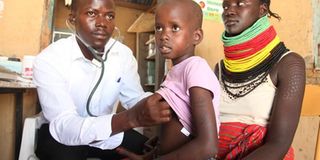In Turkana, one nurse is also the doctor for 3,000 villagers

Edward Munene attends to a young patient at Loreng’elup Health Centre in Turkana. He is the only medical officer for a population of over 3,000. PHOTO | CORRESPONDENT |
What you need to know:
- On a typical working day, Edward, who works seven days a week, opens the health centre at 7am.
- The reality is that he works alone and long forgot the luxury of work-free weekends.
- The public institution uses equipment donated by the Safaricom Foundation.
Loreng’elup is a small village in Turkana East, sitting about 60 kilometres from Lodwar Town, the county headquarters.
At the end of a long, dusty, winding rural road, is Loreng’elup Health Centre, which serves more than 3,000 people from 11 hamlets.
The health centre is just like any other in a backwater rural area, except that only one man serves there.
Mr Edward Munene is the doctor, nurse, midwife, pharmacist, counsellor, cook, cleaner and receptionist, all rolled into one.
Pregnant mothers walk dozens of kilometres to consult the young graduate of Murang’a Medical Training College.
“It is very challenging,” the 26-year-old nurse told the Nation recently, “but somebody has to do this job.”
For miles around, he is the only government “doctor”, but he takes the challenge in stride.
“Every day, children line up here for immunisation; pregnant mothers come to me in pain and I treat all manner of sick people. At night, there are always emergencies and I always have to be alert,” he said.
On a typical working day, Edward, who works seven days a week, opens the health centre at 7am to find the sick already in a queue waiting for him.
NUTRITIONAL SUPPLEMENTS
“Some spend the night in a neighbouring village as they wait to come to the health centre in the morning,” he said.
By the close of business, he will have served up to 30 villagers.
Besides immunising babies, he also distributes nutritional supplements, treats children with malnutrition and helps pregnant women to deliver.
“Occasionally, I have a traditional assistant when I am overwhelmed,” he said.
And when the stream of patients becomes a torrent, traditional assistants are of great help.
“They have been trained on basic testing and handling of sick people,” he said.
“Currently, I have 18 pregnant women under my care and I deliver four or five babies on a monthly basis. When I encounter serious cases, I send them to the referral hospital in Lodwar.”
The health centre receives many maternity cases.
Despite the convenience of delivering at the health centre, where services are free, many mothers opt to give birth at home in line with their culture. That, however, is not his biggest challenge.
“According to the health standards, there should be a reasonable doctor-to-patient ratio. A health centre like this should have at least four nurses and a doctor for a day to interchange with others in the night shift,” he said. That is the ideal.
PRACTICALLY ISOLATED
The reality is that he works alone and long forgot the luxury of work-free weekends.
The public institution uses equipment donated by the Safaricom Foundation.
The mobile-phone reception in the area is weak, which means he is practically isolated as he cannot communicate with his family in Nakuru.
He lives in a single room next to the new maternity wing and travels to Lodwar once a month for food supplies.
When that happens, the health centre has to remain closed, even when a woman in labour walks there.
“This hampers my efforts to encourage them to deliver in a hospital,” he said.
And while the Loreng’elup Health Centre is a ray of hope for ailing villages, whose only other option is traditional medicine, it remains ill-equipped.
“I can admit only one or two critical patients, but then again, we haven’t had constant supply of safe drinking water for the last three months. We rely on a local organisation to supply us with water every two weeks, and I also don’t have a budget that caters for food for the in-patients,” he said.
Aware that doctors have been on strike in some counties over their pay, Edward proposed that the government involve doctors in making decisions that affect the management of the health sector.
“It is not possible for somebody seated in an air-conditioned boardroom to understand what I am going through here in the hardship area. Medical staff have real issues and it is only when you work in such conditions that you understand what we go through,” he said.





